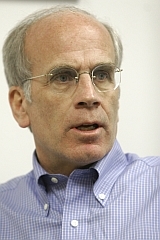 (Host) As 2007 draws to a close, we continue our review of the top stories of the year. Today, we turn to politics.
(Host) As 2007 draws to a close, we continue our review of the top stories of the year. Today, we turn to politics.
There’s a theory that more legislation is passed in odd-numbered years, when lawmakers are not distracted by running for office.
But as VPR’s Steve Delaney reports, politics seldom took a back seat to policy in the past twelve months.
(Delaney) Governor Jim Douglas and legislative leaders pledged to work together, as the lawmakers convened in January. That harmony lasted about six weeks, with Douglas firing the first shot
(Douglas) "As we head into the Town Meeting break Vermonters have every right to ask what the Legislature’s been doing to make Vermont more affordable, to make our economy stronger, and our families more prosperous. The answer, unfortunately is very little action.”
(Delaney) Senate President Pro-tem Peter Shumlin responded that if there was any inaction, the Governor was behind it.
(Shumlin) "We were talking about the importance of climate change. The governor’s reaction was, it’s not an issue. We brought him along. He went out and said the dairy farmers were in good shape. We said that’s not what we’re hearing, from our dairy farmers. He came along. We went out on the Bennington office building and said this is a disaster. It’s is not being managed. There’s no leadership from the governor. He came along. So, we welcome his participation. We’re doing policy. We would wish he would do less politics and join us.”
(Delaney) That wish never came true. On gay marriage, on funding scholarships, on property tax reform – on every major issue – the two sides found fresh reasons to disagree, and to blame each other for the absence of progress. And there’s no indication that the discord has diminished as lawmakers prepare to gather again in an election year.
For the first time in 16 years, there was a new face in Vermont’s congressional delegation. Peter Welch replaced Bernie Sanders in the House when Sanders succeeded Jim Jeffords in the Senate.
Political analyst Eric Davis says Welch was quickly at home in Congress.
(Davis) "He did a very good job of solidifying his political position, very early in his time in the House of Representatives.”
(Delaney) But Welch got in trouble at home for refusing to embrace the springtime surge for impeaching the president. The voters of 37 towns joined in that call at Town Meeting.
Welch reported those results on the House floor.
(Welch) "What motivated this effort is a commonly shared view that this administration has grossly abused its power and pursued terribly misguided policies. Madam Speaker, while I disagree with the tactic of impeachment, I completely share the goal of restoring accountability and a new direction to our government.”
(Delaney) Bernie Sanders also had a transitional year, moving from House to Senate, and becoming at ease on the bigger stage.
(Sanders) "I think we can have a significant impact. The truth of the matter is that the Senate is a pretty conservative institution. And I would hope that a number of us who were just elected as progressives will be speaking up for the declining middle class, for people who don’t have health insurance.”
(Delaney) In the Senate as in the House, Sanders continued to insist on a better deal for the poor and for veterans.
For Patrick Leahy, it was a year of consolidating his considerable power as chairman of the Senate Judiciary Committee. VPR’s Bob Kinzel visited Leahy in Washington when the detention camp at Guantanamo Bay was a hot topic.
(Kinzel) "Leahy says Guantanamo has yielded little valuable information, and has damaged this country’s reputation around the world.”
(Leahy) "It would not endanger our safety at all to close Guantanamo today. What it would do is send a signal to the rest of the world that America is going to start following its own laws.”
(Kinzel) "Leahy and the Democrats face some major obstacles in trying to change the policies of the Bush administration. They need the support of 60 senators to prevent a filibuster, and two-thirds of the Senate to override a presidential veto. As a result, so far, most of their reform efforts have not been successful.”
(Delaney) There was one other striking example of partisanship in Vermont. Former President Bill Clinton was warmly received at Middlebury College. President George W. Bush did not come to Vermont. Again. It’s the only state he hasn’t visited, perhaps because his approval ratings are lower here than anywhere else, and, perhaps, because the voters of 37 towns want him impeached.
For VPR News, I’m Steve Delaney.
Note: Our review of 2007 continues tomorrow with the story of state workers in Bennington, who say their workplace made them sick.
AP Photo/Toby Talbot